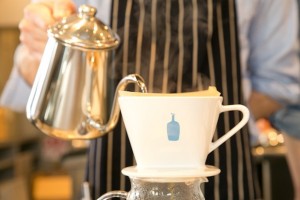
The rise, rise and rise of Blue Bottle continues. After its much-hyped arrival in chicly run-down Kiyosumi-Shirakawa in 2014, it swiftly went more metropolitan with branches in Aoyama and Shinjuku.
Now its expansion rolls on with three new branches: Roppongi in September, Nakameguro in October, and Shinagawa later in autumn.
It is clearly hedging its bets with different kinds of districts. Roppongi has been gentrified in the last few years by Mori Building Company and now has plenty of sites hoping to attract moneyed clienteles, not least a tony outlet of Tsutaya with a Starbucks inside. Shinagawa is a newly developed business district, while Nakameguro is a central yet local-feeling community with more than its fair share of hipster-y eateries and drinkeries.

The Roppongi cafe will open in Tri-Seven Roppongi, a “striking new landmark” opposite Tokyo Midtown. The Nakameguro space will include areas for workshops and training, a gimmick that feels right up the demographic’s line. The Shinagawa coffee shop will be on the third floor of Food & Time Isetan, a curiously named branch of the department store.
The key question is: Will all this result in third-wave coffee overload? The major selling point about third-wave coffee shops were their novelty and the supposedly better quality experience offered, in addition to a kind of exoticism from being mostly foreign-derived. However, the more third-wave coffee shops that appear, the more ordinary and familiar they become, and the market may well become saturated. After all, the numbers of people willing to pay more and wait longer for a cup of joe in Japan, even in Tokyo, are not infinite.
And yet, we should keep in mind that Starbucks is now the largest coffee chain in Japan in terms of market share (over 40% in 2013), proving that even when your whole schtick is offering a pricier, better product than your competitors, it needn’t it caps your expansion. And Doutor, which long had an easy ride in the market by dint of being dirt cheap and not much else, has picked up its game to counter the foreign upstarts like Starbucks, which recently celebrated 20 years in Japan, and Tully’s. As a result, Doutor has attempted to rebrand itself, perhaps not wholly successfully. It has also been priced out by the convenience stores, most chains of which now offer very cheap coffee and even lattes to go or even drink in, since some stores have seating areas.
The second wave has been forced to adapt to survive and so will the third wave.
